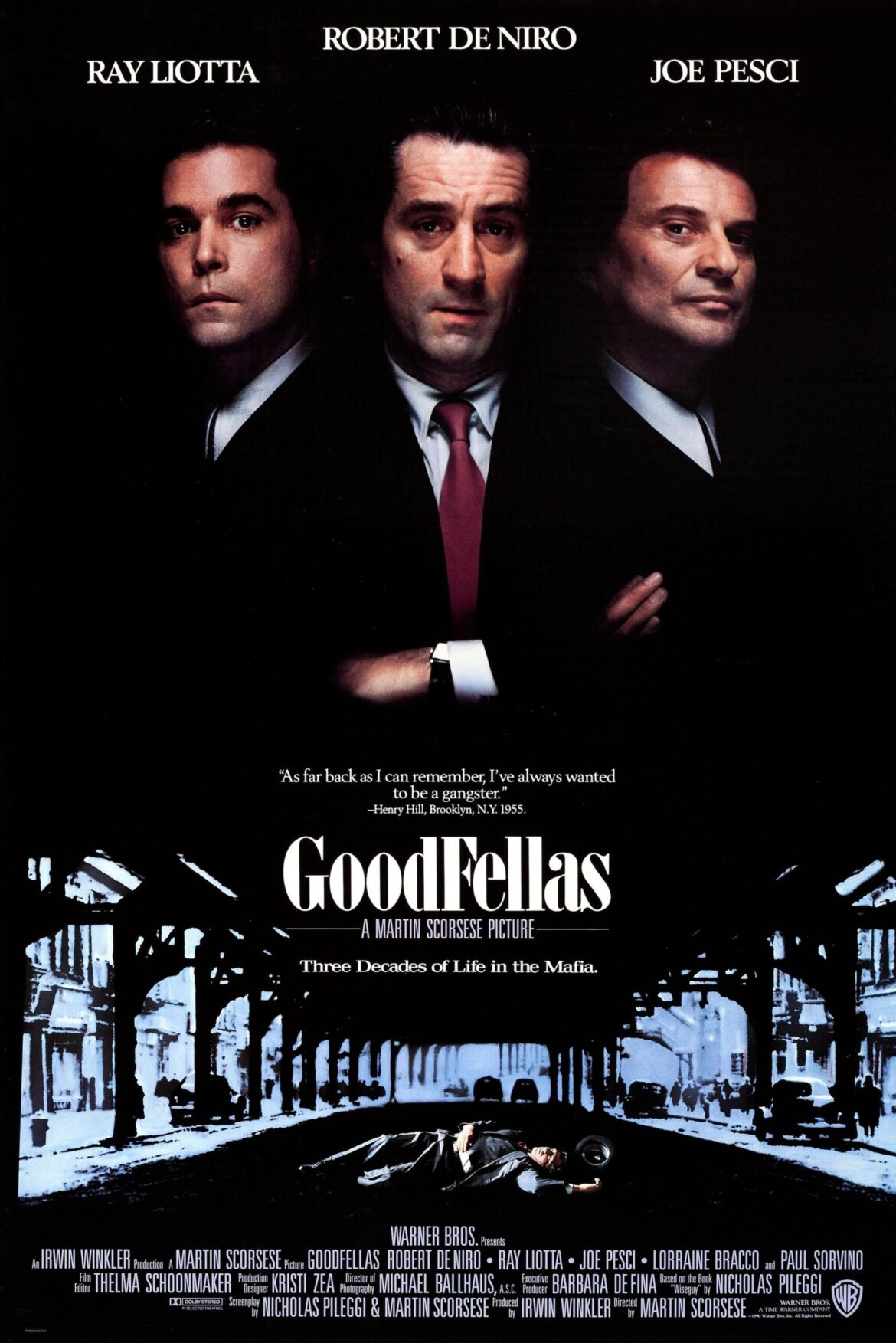Goodfellas (1990) – Scorsese’s Riveting Crime Epic
Type: Movie
Country: USA
Genre: Crime, Drama
Release Date: September 19, 1990
Duration: 146 minutes
Director: Martin Scorsese
Production Companies: Warner Bros., A Band Apart, The Kings Road Entertainment
Cast: Ray Liotta, Robert De Niro, Joe Pesci, Lorraine Bracco
Quick Review:
Martin Scorsese’s “Goodfellas” (1990) is a seminal work in the crime genre, celebrated for its raw portrayal of the mob life and its groundbreaking storytelling techniques. With its stellar performances, dynamic direction, and immersive cinematography, the film offers an intense and unforgettable glimpse into the world of organized crime. “Goodfellas” is not just a crime film but a powerful drama that explores loyalty, ambition, and the consequences of a criminal lifestyle.
Plot Summary:
“Goodfellas” chronicles the rise and fall of Henry Hill (Ray Liotta), a young man who becomes involved with the mob in Brooklyn. The film follows his journey from a promising young gangster to his eventual disillusionment and cooperation with the FBI. Through Henry’s eyes, viewers experience the glamorous yet dangerous world of organized crime, from heists and betrayals to the inevitable downfall that comes with a life of crime. The narrative is based on Nicholas Pileggi’s non-fiction book “Wiseguy.”
Characters and Performances:
- Ray Liotta (Henry Hill): Liotta delivers a compelling performance as Henry Hill, capturing the character’s transition from an eager young gangster to a disillusioned informant. His portrayal is both charismatic and deeply human, anchoring the film’s emotional core.
- Robert De Niro (James “Jimmy” Conway): De Niro’s portrayal of Jimmy Conway is intense and layered, showcasing his character’s ambition and ruthlessness. De Niro’s performance is a testament to his ability to convey complex emotions and moral ambiguity.
- Joe Pesci (Tommy DeVito): Pesci’s role as Tommy DeVito is both explosive and memorable. His portrayal of Tommy’s volatile personality and quick temper earned him an Academy Award for Best Supporting Actor. Pesci’s performance is a key element in the film’s dramatic tension.
- Lorraine Bracco (Karen Hill): Bracco plays Karen Hill, Henry’s wife, providing a critical perspective on the mob life through her character’s experiences and struggles. Her performance adds depth to the personal side of the story.
Direction and Cinematography:
Martin Scorsese’s direction is masterful, using dynamic camera work and a fast-paced editing style to immerse viewers in the world of organized crime. The film’s iconic tracking shots and energetic sequences reflect Scorsese’s innovative approach to storytelling. Cinematographer Michael Ballhaus’s work enhances the film’s gritty realism and intense atmosphere, capturing both the glamour and the violence of the gangster lifestyle.
Music:
The soundtrack of “Goodfellas” is a carefully curated selection of songs from the 1950s and 1960s, chosen to reflect the era and mood of the film. The use of classic tracks enhances the film’s authenticity and emotional impact, from the upbeat tunes during the film’s highs to the more somber tracks that underscore its darker moments. The music complements the film’s pacing and adds to its immersive experience.
Why It Endures:
“Goodfellas” endures as a classic due to its groundbreaking portrayal of the mob life and its influence on the crime genre. Scorsese’s innovative direction, combined with powerful performances and a gripping narrative, sets the film apart as a benchmark in cinematic storytelling. Its exploration of themes such as loyalty, ambition, and the consequences of crime resonates with audiences, solidifying its place as one of the greatest films of all time.
In Conclusion:
“Goodfellas” (1990) is a cinematic masterpiece that offers an unflinching look at the world of organized crime. Martin Scorsese’s direction, coupled with standout performances from Ray Liotta, Robert De Niro, and Joe Pesci, creates a film that is both exhilarating and thought-provoking. Its lasting impact on the crime genre and its ability to captivate audiences with its intense narrative ensure its status as a timeless classic.


